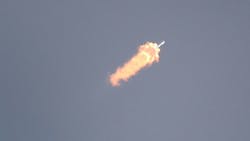SpaceX Launches Sensitive Military Mission, Nails Landing
Elon Musk’s Space Exploration Technologies Corp. launched a sensitive mission for the U.S. military and landed the rocket’s booster on land, marking the company’s fifth successful mission of 2017.
A Falcon 9 rocket carrying NROL-76, a classified payload for the National Reconnaissance Office, rumbled aloft about 7:15 a.m. Monday from the Kennedy Space Center in Florida, a livestream of the mission on SpaceX’s website showed. The launch, originally planned for Sunday, was delayed 24 hours due to a sensor issue.
Roughly nine minutes after lifting off, the rocket’s first stage returned to Earth, a feat that SpaceX first accomplished in December 2015. Landing, refurbishing and reusing rockets is key to the company’s vision of making space travel increasingly affordable.
“Launch and landing of the NRO spy satellite was good,” CEO Musk said on Twitter. “Tough call, as high altitude wind shear was at 98.6% of the theoretical load limit.”
Minutes before the launch, Musk had warned that “winds aloft are unusually high,” calling the conditions “worrying, but not a showstopper.”
Security Missions
SpaceX’s Falcon 9 rocket won U.S. Air Force certification for national security space missions in May 2015, breaking a lock long-held by United Launch Alliance, a joint venture between Boeing Co. and Lockheed Martin Corp. Contracts for military launches include satellites that let troops communicate on battlefields and are estimated to be valued at about $70 billion through 2030.
Though SpaceX sees rapid, reusable rockets as the key to driving down launch costs and opening up access to space, the Air Force is still exploring how the certification process will need to be adapted to use pre-flown hardware. SpaceX reflew a previously used rocket booster for the first time in March for commercial satellite customer SES SA.
“Unlike commercial satellites, these satellites are not privately insured -- a launch failure means the nation and its warfighters are without capability until a replacement is launched,” James Spellman Jr. of the Air Force Space Command’s Space and Missile Systems Center said in an email. “The certification process needs to properly account for previously flown hardware to launch our national security space systems safely and securely.”
SpaceX plans to fly 20 to 24 missions in 2017 for customers that include the National Aeronautics and Space Administration and commercial satellite operators. The Hawthorne, Calif.-based company has contracts with NASA valued at $4.2 billion to resupply the International Space Station using an unmanned Dragon spacecraft and to ferry astronauts there with a version of Dragon that is capable of carrying crews.
By Dana Hull
About the Author
Bloomberg
Licensed content from Bloomberg, copyright 2016.
